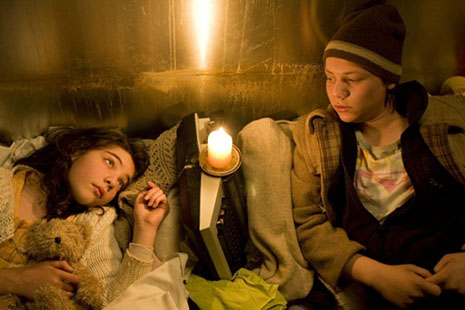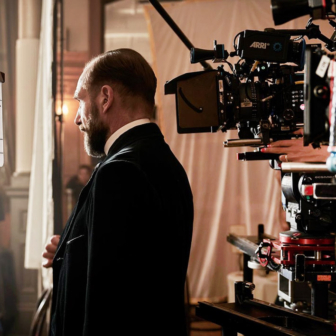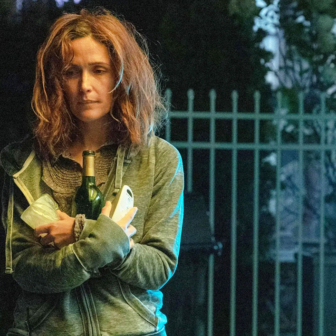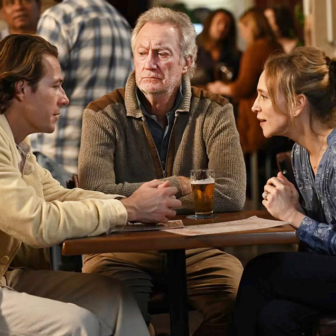THERE WERE so many good Australian feature films around in 2009 that they provoked into existence something you could almost call a critical climate, a most dangerous development. There’s something like an argument happening when Louis Nowra, in the current Monthly, deplores what he sees as “the monotonous bleakness of most of the films” while Brian McFarlane, in Australian Book Review, more accurately says “they are all serious, though not solemn,” a distinction very much worth making. Both articles appear because at the end of every year there is a widespread compulsion to poke and prod at the bedevilled industry, and to emerge with new diagnoses; it is rarely imagined that the patient, though struggling, might still be reasonably healthy.
McFarlane listed his own ten best: My Year Without Sex, Samson & Delilah, Cedar Boys, Beautiful Kate, Last Ride, Bastardy, Disgrace, Mary and Max, Blessed and Balibo; “Australian society has been subjected to uncompromising scrutiny.” Nowra doesn’t deny the cinematic quality in such as these, and he rightly praises George Basha’s The Combination and Jonathan auf der Heide’s Van Diemen’s Land. But, he says, “few Australians are interested in the world of Lebanese Australians or convict cannibals.” Of Ana Kokkinos’s extraordinary Blessed, he writes that it “goes into melodramatic overdrive, featuring addiction, poverty, murder, feckless men, runaway kids, pornography, hints of paedophilia and marriage breakdown in a Melbourne that looks even uglier than the real thing” (phew!).
McFarlane, on the other hand, finds Blessed daring, bravely iconoclastic, and rigorous in its way of telling a many-stranded story: “It may just be a great film.” Even a little short of that, for “melodramatic overdrive,” you could read courage in pursuing family-centred stories to their real emotional boundaries; and in Blessed, we can see something like the bravura of an Almodovar (vide Broken Embraces, currently around).
Along the way, Nowra writes very intelligently of the way these recent films have extended the local gallery of screen faces: like those of Ben Mendelsohn and Rachel Griffiths, older and more expressive than they were, in Beautiful Kate; the new, different looks of the Lebanese boys in Cedar Boys and The Combination; Anthony LaPaglia’s in Balibo. Nowra is a man of the theatre, and he values performance. It is odd that at the same time he doesn’t seem to value conflict, without which drama doesn’t happen, nor catharsis, which has to do with extremity: deep grief and loss (Frances O’Connor in Blessed), outrage in the face of mass murder (LaPaglia at the end of Balibo).
Nowra is inconsistent, too, in that judging the films as a year’s harvest he is really reducing each of them to the darker patches of its plot. His main concern is that only one, Samson & Delilah, has found substantial audiences and (so far) made any money. After saluting the manifest “authenticity and experience” in the two Lebanese community films, he says that nevertheless “they are part of a host of films so dispiriting that they make Leonard Cohen seem positively cheery”; too many, furthermore, are badly plotted; and the lack of box office success is to be laid at the door of the film makers. They don’t realise that while “back in the 60s and 70s audiences wanted to watch serious films seriously” times have changed, and “the era of art films is over... It’s easy to blame distributors, but they do know what their audiences want.”
All this invites a notion of a small national industry entirely composed of well-calculated, predictable genre work. There’s a lot to be said for genre, but we’ve done it: landscape movies, outback movies, period costume dramas hanging off classic novels (never again, I hope). If, on Nowra’s assumptions, someone had proffered the concept of Samson & Delilah – the one small-scale local movie which he acknowledges as successful – who’d have taken it on? The desert, stray black kids at the bottom of the social heap? Good ideas lead into unknown territories; they don’t follow an idea of what distributors and audiences want. Samson & Delilah was completely unpredictable; Nowra doesn’t seem to have noticed how it altogether confounds his demand that we move closer to a Hollywood which – as he sees it – “epitomises illusion and dreams.” (Nor has he noticed those other Hollywoods, which blast illusion and take us through nightmares; goodnight Hitchcock, goodnight Welles.)
Brian McFarlane sees further, toward “a new maturity in the ranks of international cinema,” and he thinks that what the past year’s films do in general is “evoke a sense of Australian society, whether in isolated communities or in suburbia or its multicultural fringes.” I’d give some of them more than that, some of them less. The problems with Beautiful Kate, for example, have to do with the story’s fundamental base in William Faulkner country; the Flinders Ranges hang there as a fortuitous backdrop, and what we have is cooked-up melodrama, which is not about this society or any other. Even with excellent performances and strong direction, the painted-in purple bits – incest, suicide, awful car crash – can’t guarantee seriousness.
A national cinema comes to meet its audiences, but it doesn’t have to be insistently, stereotypically about us; questions of national identity are exhausted, drained-out – if not, indeed, discredited. Samson & Delilah might ring bells in any settler society at all, and not incidentally it shows local audiences how foreign a country Central Australia is. My Year Without Sex, like its excellent predecessor Look Both Ways, grips its suburban setting at close quarters, and finds drama worth playing in the ordinary urban west. Disgrace is here, Africa, anywhere. The Lebanese films have their special vitality because they come out of real and particular communities, where young Lebanese men desire beautiful blonde Anglo-Australian girls; with those films, the Middle East is validly present among us, and “Australia” becomes an incurably complicated idea.
There’s a sequence in Balibo which should fix anybody’s nationalism. An Indonesian helicopter flies fast and low, peppering shot on the stretch of East Timorese jungle where José Ramos-Horta and Roger East – Oscar Isaac and Anthony LaPaglia in superb performances – are struggling on the tracks of the Balibo Five. Horta forces East to recognise what they’re involved in; the Indonesian military helicopter is an American machine, bought with British funding; now the military is after East, the Australian journalist, and they know he’s there because Australian intelligence told them. The journalist’s own country is complicit in a major betrayal; he can only act alone. In the context of national cinema, the courage of Balibo – following on from that of certain journalists, in particular Jill Jolliffe – lies in telling much of Australia what it doesn’t want to hear, and telling it with great cinematic eloquence. For that reason, whatever the short-term box office yields, such a film will last. •





